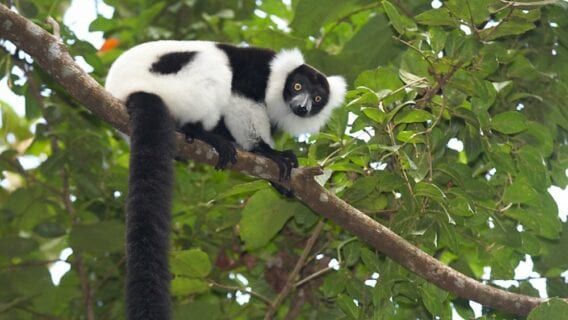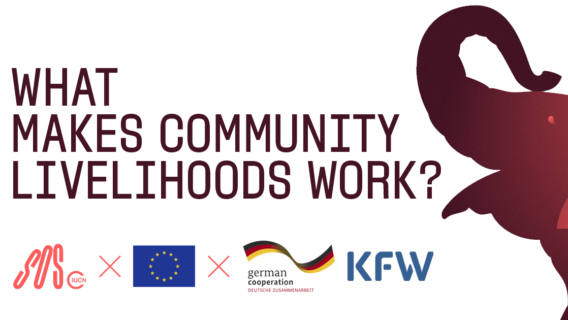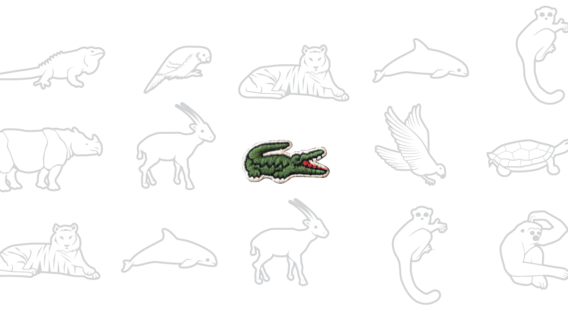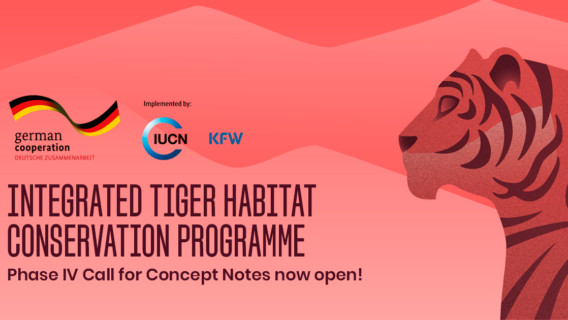Looking Back at 2023: Our Year in Review

IUCN Save Our Species and the Integrated Tiger Habitat Conservation Programme (ITHCP) went beyond supporting 20 new projects on species conservation frontlines.
Together with our partners, we actively contributed to global initiatives aligning with the GBF’s targets, most notably Target 4 on threatened species recovery. We also implemented Sustainable Development Goals (SDGs), and played a role in climate change mitigation throughout the year.
Below are some of our highlights:
High-level efforts

Launched during the Twenty-fifth meeting of the Subsidiary Body on Scientific, Technical and Technological Advice (SBSTTA-25), the IUCN Global Species Action Plan (GSAP) provides a guide for countries to integrate species actions into their national biodiversity strategies and action plans (NBSAPs) to implement the GBF. The new Plan sets a transformative path for all conservation actors to protect and restore species under threat of extinction, and marks a critical step towards achieving the GBF’s goals.

The introduction of the latest iteration of the Global Tiger Recovery Programme (GTRP 2.0) marked a turning point for the ITHCP, as it engages key tiger stakeholders in a more targeted manner, both at a high policy level and on the ground. It further accentuates the need to address challenges such as human-wildlife conflict, in line with Target 4 of the GBF.
IUCN Save Our Species and ITHCP successes
Thanks to continued support from our donors, we have secured critical funding that will ensure a viable future for different species.
SOS Lemurs will now continue its important work in Madagascar until 2029, protecting both species and their habitats while also creating livelihood opportunities for the Malagasy people thanks to a 9.5 million CHF second phase. The initiative implements measures that restore lemur habitats and have a direct link to climate change mitigation. In doing so, it contributes to all four long-term goals of the GBF, as well as the Paris Agreement on Climate Change. Furthermore, other conservation measures aimed to support local communities contribute to the SDGs.

In 2023, the ITHCP also launched a call for concept notes for Phase IV, which marks a pivotal juncture in the global fight to safeguard tiger populations and their ecosystems. Indeed, this new phase seeks to implement a comprehensive and sustainable approach that contributes to key areas of the GTRP 2.0.

Furthermore, in June we launched the third call for proposals for the Fondation Segré Conservation Action Fund initiative, supporting the conservation of threatened freshwater species including decapods, fishes, molluscs and all odonates. According to the first global freshwater fish assessment carried out by the IUCN Red List of Threatened SpeciesTM, 25% of the world’s freshwater fish species are at risk of extinction, with 17% of them affected by climate change.

Local level achievements
At the local level, our partners helped bridge the gap between high-level policy and front-line conservation work by translating these strategies into meaningful, localised actions:

In Madagascar, one of our partners established 12 mobile clinics that provided services to 1,462 patients, who can pay for services with non-cash payments such as tree seedlings, enabling them to access healthcare without utilizing forest resources. The goal of this project was to deter local communities from carrying out illegal activities such as deforestation or poaching to be able to afford healthcare.

Another partner in Uganda ended their project by training and employing over 600 artisans. This was part of an effort to reconvert poachers into sculptors, using the wires from snares as materials. They managed to earn over 200,000 USD in direct revenue, diversifying sources of income and revitalising local businesses, boosting healthcare and supporting schools.

And finally, one of our young conservationist partners in India discovered a brand-new species of dragonfly: Epithemis wayanadensis. Thanks to a research grant supported by the Fondation Segré Conservation Action Fund, the team employed a mix of visual and DNA data to make the identification.
Successful conservation action starts with you, our supporters and partners, so we would like to thank you for your commitment to Keep Nature Standing.
Have a wonderful year!
Photography credits
GSAP: Gabriel Bienzobas Fernández
Tiger: Sascha Kohlmann
SOS Lemurs: S. Meys
Madagascar: Laure Montchamp
Uganda: The Snares To Wares Initiative
India: Ayikkara Vivek Chandran, David Valiyaparambil Raju, Subin Kaniyamattathil Jose, Zeeshan Ayaz Mirza




